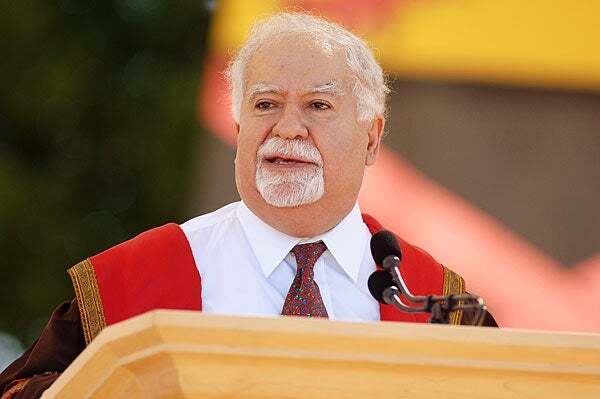Gregorian: Be good ancestors to future
Alumnus Vartan Gregorian, president of the Carnegie Corporation, told advanced-degree candidates to be mindful of their connections to history: “Listen with your inner ears to those who went before you … who all wanted to be good ancestors to you.”
Born to a poor family in Tabriz, Iran, Vartan Gregorian arrived at Stanford in 1956 alone, with only a basic grasp of English and with no knowledge about the United States or higher education. Had someone described his future to him—serving as a university professor, provost and president and as president of the New York Public Library and the Carnegie Corporation—”I would have said that such prediction was in the realm of fantasy or lunacy,” he said at Saturday’s Commencement program. “I know it is a cliché to say ‘only in America,’ but in my case, that is the truth.”

At the advanced-degree Commencement, Gregorian, president of the Carnegie Corporation and a Stanford alumnus, shared his story of arriving in the United States, “alone without a clue about America with regard to higher education.” He added: “I certainly had no clue at all about Stanford, but Stanford adopted me.” (Image credit: Rod Searcey)
Gregorian, the former president of Brown University and since 1997 the president of the Carnegie Corporation, delivered the Commencement address at Elliott Field at a ceremony awarding 2,147 master’s degrees and 954 doctoral degrees. The university held separate Commencement exercises this year for students earning advanced degrees and those receiving undergraduate degrees, due to construction at Stanford Stadium.
In his remarks, Gregorian credited his years at Stanford, where was awarded AB and PhD degrees in history in 1958 and 1964, respectively, with helping him to understand the relationship of the individual to the social, political and cultural world. “One thing I’m always grateful to Stanford for was that it did not try to make me abandon my past, but encouraged me to embrace it, to validate it and let my past help guide my future.”
Gregorian has taught at universities including the University of Texas, the University of California-Los Angeles and the University of Pennsylvania, where he also served as provost. As the head of the New York Public Library in the 1980s, Gregorian oversaw that institution’s revitalization, a feat that university President John Hennessy called “one of the city’s great civic achievements.” Gregorian has been awarded the National Humanities Medal and the Presidential Medal of Freedom and is a fellow of the American Academy of Arts of Sciences and the American Philosophical Society.
As a young boy in Iran, he could never have imagined himself interrupting a lecture to ask a question, Gregorian wrote in his 2003 memoir, The Road to Home: My Life and Times. At Stanford, he learned not only that he could question professors, but he also gained the courage to think “those big, imponderable thoughts that are our companions throughout our lives,” such as, “What is our relationship to universal order?” and “What is our place as a human being amongst the great sea of mankind?” Although the questions ultimately may be unanswerable, “they have helped me to create a framework for the way I have lived my life,” he said.
Gregorian repeated the observation made by the influential physician Sir William Osler that young men and women should choose their ambitions carefully, since they are likely to achieve them. “Since you have the education, the knowledge and the training to realize your ambitions, be sure as you can that your ambition also reflects what you really love to do,” Gregorian said.
The speaker also advised graduates not to confuse their jobs with their careers and to remain lifelong learners. Of his positions in academia, libraries and philanthropy, Gregorian said: “I’ve never considered any of the positions I’ve held as jobs. In fact, I even think of them as more than careers. To me, they have been missions in which teaching and learning are primary ingredients, with me as the primary student.” Students can expect to change not just jobs but careers, Gregorian said, adding, “I have invented myself many times and I’m sure you will do the same thing.
Gregorian drew on sources ranging from Kahlil Gibran, Gabriel Garcia Marquez, Alexis de Tocqueville, Martin Luther King Jr. and Plutarch, but credited his grandmother, an illiterate peasant, as his first teacher.
“I don’t believe that she knew where Greece was, nor Rome, nor Stanford,” Gregorian said. “She certainly did not know who Plutarch was. But even so she taught me the same lesson as Plutarch highlighted in his life almost 2,000 years ago when he said essentially that character makes the man and woman.”
Coping with success is easy, but adversity and failure reveal true character, Gregorian said. “How nimble you are about getting back on your feet after some large or small disaster, defeat, setback, will help you to determine just how far those feet of yours will take you in the world.”
Gregorian concluded his remarks with a reminder to graduates of their connections to history. “Try to listen with your inner ears to those who went before you, parents, grandparents, great-grandparents and on and on, who all wanted to be good ancestors to you,” he said.
“As an historian, educator and a fellow student, I feel bound to remind you that the time has come for you to return the favor. We have to learn to be good ancestors to the future.”
